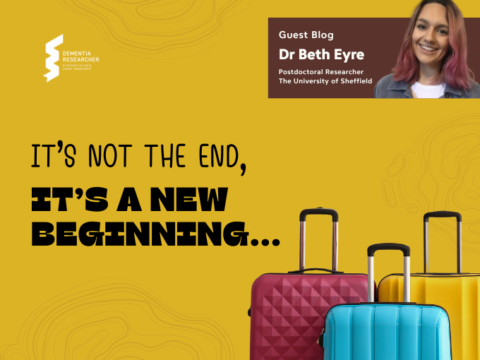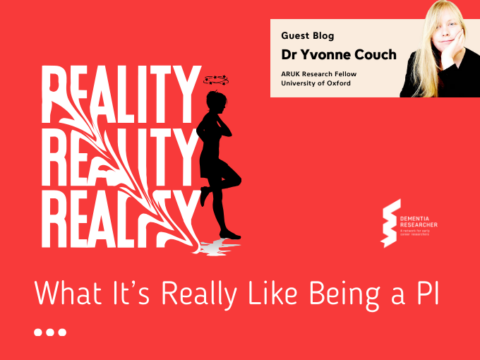Today, hardly a day passes when we don’t hear about a new discovery in the fight to combat dementia, every one adds another small piece to the massive jigsaw that will event build up a picture of the disease, how to prevent it, diagnose it, treat it, and care for those living with it. For World Alzheimer’s Day we asked our staff bloggers to share what they think have been the biggest discoveries in their field of research in the last 12 months, and what they think might be the hot topics in the coming year. We also wanted to share some fantastic news from Race Against Dementia, who are bringing four more experts to help solve the puzzle.
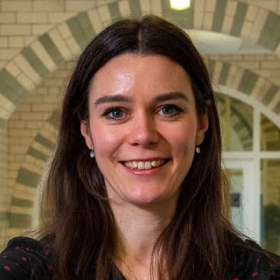
Dr Clarissa Giebel
Dementia & Social Care Research
By Dr Clarissa Giebel, Research Fellow, University of Liverpool
Dementia, everyday functioning, health inequalities
The past 12 months, 18 months really, have been captured by how COVID-19 has affected care for people living with dementia, those living in the community and those living in care homes. But research has also focused a great deal, understandably, on the many unpaid carers providing care for someone with dementia. We have seen many negative impacts of the pandemic and its restrictions on people with dementia and unpaid carers, ranging from faster deterioration, to the emotional impacts of increased care duties and not seeing your relative with dementia at the care home, to being apprehensive to emerging from lockdowns and severe restrictions. Let us not forget the research focus on care home practices and infection risks though. And yes, you will find some of my and my team’s research amongst this!
So what is next? We might be emerging out of the worst of the pandemic, in the UK at least, but there is always the potential for restrictions to be re-imposed, and for long-lasting effects on the well-being of and care provision for people with dementia. Especially, in light of yesterday’s announcement of a new health and social care levy, I believe the next 12 months will continue focusing on the long-term impacts that the pandemic is having on the care sector, and from April 2022 onwards, on the changes that such a (minor) change in funding may have on dementia care provision.

Beth Eyre
Pericytes in the basement
By Beth Eyre, PhD Student, The University of Sheffield
Neurovascular & cognitive function in preclinical models of Alzheimer’s
We still do not fully understand how our energy-demanding brains regulate their energy supply. But, each year we discover, in more detail how cells of the neurovascular unit work together to ensure energy demands are met, in both health and disease.
Over the past year or so, the field has gained a more detailed understanding of the role of pericytes within our brains – and the roles these cells may play in brain diseases that lead to dementia.
Pericytes, a type of mural cell, wrap around small vessels of the brain (including capillaries, precapillary arterioles and postcapillary venules). Accumulating evidence suggests that these cells may play many important roles within our brains: including the development and maintenance of the blood-brain-barrier (BBB), regulation of blood flow to the brain, as well as playing a role in the clearance of waste from our brains. Many studies suggest that in Alzheimer’s disease (AD) pericyte loss occurs, which can lead to the breakdown of the BBB, impair the clearance of amyloid beta, which may ultimately result in cognitive dysfunction.
The neurovascular research field is an exciting field to be part of right now – with many new discoveries being made. Personally, over the next year I’m excited to see even more research into pericytes, especially research looking at how this cell type could be targeted in brain diseases that can cause dementia. Additionally, further research into the glymphatic system (involved in the clearance of waste from the brain, especially during sleep) will be interesting, as evidence suggests this clearance system may be impaired in AD.

Felicity Slocombe
Dementia and Conversation Analytic Research
By Felicity Slocombe, PhD Student, Loughborough University
Interaction, and conversations in dementia
Progress has been made in studying how interactions can be used to support the personhood and identity of people living with dementia (PLWD). Research from Pilnick et al. (2021) in the acute hospital setting has shown the importance of context for interactional strategies that health care practitioners (HCP) can use in responding to hard-to-interpret talk from PLWD. This research demonstrated the accomplishment of HCP in supporting the identity of PLWD by not drawing attention to the hard-to-interpretness of their talk, as doing so potentially saves face of the PLWD from not having to repeat their talk again and again without the HCP being able to understand their meaning.
Research from Lindley (2020) similarly found co-participants in interactions support the personhood of PLWD by using certain strategies which allow opportunities for competence from PLWD to emerge. For the next 12 months research focus should be upon more conversation analytic research in this area. Previously, recommendation for best practice was seldom based upon interactional research evidence. Recommendations did not consider interactional context, or differences between individuals or people living with different forms of dementia, with recommendations based upon anecdotal evidence. This can be misrepresentative of what happens in interaction, so we must work to build an empirical evidence base for communicative training and advice with PLWD which is supportive of identity.
In conversation analytic work more generally, there is a call for more involved co-research designs, especially as HCP have said they have more faith in communications training when PLWD themselves have stressed the importance of interactional details.

Dr Kamar Ameen-Al
Minimising the risk
By Dr Kamar Ameen-Ali, Research Associate, University of Glasgow
Neuroinflammation and traumatic brain injury
My research area is focused on understanding the link between traumatic brain injury (TBI) and the degenerative brain diseases which lead to dementia. This includes repetitive head injuries which contact sport athletes might sustain as a result of multiple concussions or repeated heading of a football, for example.
Recently there has been an increase in media focus specifically on the issue of dementia in football, highlighting the need for better understanding of neurodegenerative disease risk in former athletes. A significant paper published in the last 12 months by the FIELD study (Football’s InfluencE on Lifelong health and Dementia risk) showed that the risk of neurodegenerative disease differed by field position. Defenders were found to be at five times greatest risk, but goalkeepers were found to be at no significantly greater risk compared to the general population. In addition, the paper also reported the longer the career length, the greater the risk of neurodegenerative disease.
The progress made by the FIELD study has resulted in policy changes made by the Football Associations of Scotland, England, and Northern Ireland, who have restricted heading in youth football as a precautionary measure. Progress over the next 12 months should look to minimise the risk of dementia-related neurodegenerative disease in former professional athletes, with potential further changes needing to be made which may include further heading restrictions and guidelines, and improved concussion education and concussion protocols.

Hannah Hussain
Quality of Life
By Hannah Hussain, PhD Student, The University of Sheffield
Health Economics, measuring and valuing health
My research area is measuring and valuing quality of life for use in economic evaluations. Over the last 12 months there have been developments in this area, or rather confirmations of existing hypotheses. The MODEM study conducted by London School of Economics was a large observational project charting the lives of people with dementia and their caregivers over an entire year. The publications from this project are super interesting and are continuing to be released so definitely check it out! Why this project was particularly exciting for researchers in my area is literally in the name whereby MODEM was short for “modelling outcome and cost impacts of interventions for dementia”.
In 2020, the MODEM project team published an analyses paper of cross-sectional data from the study. Here the data of 307 people with all stages of dementia and their caregivers was explored. They had completed a range of instruments assessing outcomes such as cognition, QoL, burden and behavioural symptoms. The data were subjected to various fancy statistical tests, and it was found that disease severity – as measured by cognition (via MMSE) was not significantly associated with Quality of Life (QoL) of the people with dementia or the caregiver – particularly for self-reported QoL. Overall, the data showed that actually, severity of dementia is not associated with lower QoL. This finding has been shown in other recent studies and may in fact be contributing to a culture change in the research.
If the goal of treatments is to improve QoL, then perhaps using measures of cognition as a marker of treatment success is outdated. Particularly in economic models where utilities are assigned to health states. If these health states are defined by cognition, which has traditionally been the case, and cognition does not align with QoL – then are we really capturing the right thing?

Dr Sam Moxon
Innovation through awareness
By Dr Sam Moxon, Research Associate, The University of Manchester
3D iPSC Models of Neurodegeneration
I have been challenged to reflect on what I think has progressed most in my field in the last 12 months and where I think the focus should be going forward.
My field is a bit of a strange one. It’s not neuroscience, medicine or pure biology… more a marrying of engineering and biomedical science. I work in biomaterials science; essentially I apply naturally occurring materials to create “tissue-like” environments to grow cells in. It’s a field that has always had a big part to play in orthopaedic medicine but over the last 12 months, I think great progress has been made in “spreading the word” about biomaterials to dementia researchers. It’s not a field that many dementia groups were particularly aware of and I think senior figures have done a great job of connecting with dementia researchers and vice versa. It’s a perfect marrying; an engineering mind-set meeting with biological expertise to tackle the issue of dementia from an entirely new angle. There are still few papers out there around this theme but I think over the next few years we should see a boom in exciting research coming out of taking a biomaterials approach to studying the underlying mechanisms of dementia. It allows us to answer questions we previously couldn’t and I think it is vital that gifted biomaterials scientists continue to connect with dementia research groups.
Dementia is a complex issue and it needs as many different minds working on it as possible. Biomaterials is a field to keep an eye on. I don’t think it will be long before we see a ground-breaking study published with a collaboration between a dementia research group and a biomaterials group. Watch this space!

Nathan Stephens
Community, tea and cake
By Nathan Stephens, PhD Student, University of Worcester
Exploring the use and value of Meeting Centres
In the last 12 months all that springs to mind is COVID-19 and the disproportionate impact the pandemic has had on a population that already experience so much injustice by the way things are done in everyday life. But there are positive effects that have developed from conditions of pandemic policy, and what I have seen in the 8-months working on the Worcestershire Meeting Centres Project, is that Meeting Centres, along with many other forms of Voluntary and Community Sector support have quickly adapted, and adapted well!
When in-person support ceased in March 2020, technological and nontechnological remote support including online meetings, social media, emails, garden and doorstep visits, newsletters, phone calls and activity bundles, was the only way to ensure people were supported. It is not only the delivery of support that developed, but people living with dementia and carers quickly developed technological skills too, which has fast tracked efforts to combat digital exclusion in the older populations. Also, more people have been able to access support due to the availability and flexibility of remote methods.
While for many nothing trumps a cup of tea and a slice of cake with several of your friends, generally remote support has been well received by people, and many community-based support such as Meeting Centres are offering or planning to offer blended approaches, incorporating in-person and remote provision to optimise person- and family-centred support and remove barriers to accessing support for underrepresented groups.
Staying at home may reduce the risk present from the virus and some forms of remote support are effective, however as evidence shows, it can lead to a multitude of serious problems. It is imperative that as we enter winter, government do not scaremonger older people in society and force them to live in isolation, but instead invest in the adult social care system so that vital community-based support is implemented, sustained, and scaled up. However, there are challenges here too. Such as how do we ensure investment leads to increased access and quality of community services, with many providers not routinely collecting data or monitoring performance. Answering these questions will ensure that the availability of effective support, that is absolutely necessary for people to ‘live well’, isn’t described as ‘patchy’ or a ‘postcode lottery’, but instead uniform and equitable.

Dr Yvonne Couch
Stroke is Bad
By Dr Yvonne Couch, ARUK Research Fellow, University of Oxford
Stroke, vascular dementia and extracellular vesicles
In searching for articles to review in this update I was reminded of the opening to all stroke researchers’ presentations which is basically: stroke is bad. Stroke is bad to the point that I know one researcher who shut his lab after a relative had a stroke because he realised how little he could do. However, the reality is that mild stroke isn’t actually that bad. Don’t get me wrong, it’s still not good. But chances of survivability have gone way up and with them, so have all the post-stroke complications like cognitive impairment.
Now here’s the problem. I have around 300 words and apparently everything cures stroke or improves stroke outcomes. And I mean everything. Computer gaming, transcranial magnetic stimulation, tai chi, occupational therapy, exercise. And that’s just in people, we’ve not even got into the obscure extract of guava juice studies in mice. So I’m going to go over the 300. Just a warning. Now what could potentially be taken away from these studies is that what a lot of these patients need is just a bit of input. In the same way that the big back pain studies showed that if you spend 10 minutes more in the clinic with the patient they report better outcomes, here it could be that simply the act of interaction with stroke patients is beneficial.
So rather than find specific studies which I think have pushed the field forward I’ve found a few big reviews of the field which I think improve our understanding. We’ll work through from basic stroke treatment to cognitive impairment.
The first is a meta-analysis of the use of tenecteplase in large vessel occlusion. The main clot busting drug used in stroke at the present time is alteplase, whereas tenecteplase is more commonly used for cardiac ischemia. The benefits of tenecteplase are largely associated with its longer half-life, which mean it could be given as a bolus. This shortens the stroke-to-thrombolysis time considerably as alteplase is given as a bolus followed by a drip. The meta-analysis by the Tsivouglis group demonstrated that in trials tenecteplase patients had a significantly better outcome at 3 months than those receiving alteplase. The similar side-effect profile, improved half-life and decreased cost of tenecteplase make it an appealing drug for acute stroke.
The next study I think is important I take no credit for finding, it was sent to me by a friend and I would never have found it on my own because it’s to do with imaging. Biessels’ group published a large review of pooled data in Lancet Neurology demonstrating that there are specific locations within the brain that strongly predict post-stroke cognitive impairment. Specifically, the left frontotemporal region, right parietal region and the left thalamus. The utility of this information will only become apparent when the knowledge is combined with novel thrombolytic therapies. Could we use better drugs like tenecteplase to save more of the brain, including these regions, and thus reduce post-stroke cognitive impairment?
The final study I think is important is Terry Quinn’s meta-analysis of cholinesterase inhibitors because it highlights the importance of reviewing large amounts of literature to produce robust negative findings. It demonstrates that cholinesterase inhibitors, widely used in dementia, were largely ineffective in vascular dementia. This is likely due to the different mechanistic underpinnings of cell death in the two diseases. But by highlighting the paucity of therapy available, Quinn and colleagues have potentially stimulated researchers to approach the vascular dementia differently.
Overall, what these reviews underscore is the enormity of the field. The fact that it is occasionally important to pause and take stock. To review all the major contributions in context and to come away with something more than just ‘stroke is bad’.
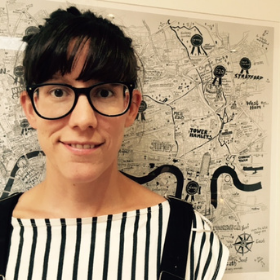
Dr Anna Volkmer
More ways to communicate
By Dr Anna Volkmer, Research Fellow, University College London
Speech & Language Therapy and Communications in Dementia
It is known that communication difficulties carry a high disease burden and are often the primary cause of relationship breakdown. In Primary Progressive Aphasia (PPA; the language led dementias) these difficulties contribute to reduced quality of life, social isolation and loneliness and carers of people with PPA report increased social isolation (Ruggero et al, 2019). Intervention research has tried to address this issue over the last 12 months by focusing less on outcomes related to the disease impairment (the number of words a person can say for example) and much more on the functional, day to day conversation (or discourse as we often call it) (Gallee & Volkmer, 2021).
To date many of the interventions for PPA and other dementias have been informed by practice-based knowledge, held by specialists in the field. Sharing this knowledge is paramount and is as valuable to informing care as the reporting of the gold standard randomised controlled trials. Two particular pieces of work stand out to me this year including the work undertaken by Mahendra et al (2020) who have described a palliative approach to management of people with PPA, which also supports the need for us to revise how we measure outcomes when we work with this client group. Currently under review is a consensus study on best practice principles for PPA, an international study bringing together clinical-academic speech and language therapists to provide guidance to practitioners working in the field. This really demonstrates the movement in this research field, toward larger, collaborative studies.
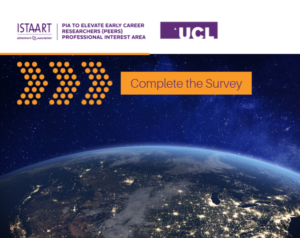 Complete the #ECRPIA Survey
Complete the #ECRPIA Survey
Your experiences and views will help inform plans for ISTAART support and new guidance for research funders, institutions and policy makers.
Complete the SurveyFinal thoughts & a big thank you
By Adam Smith, Programme Director, Dementia Researcher, UCL
It falls to me to round-off on our World Alzheimer’s Day special edition newsletter.
Our fantastic bloggers have each given an update on the hot-topics in their research fields. Of course, as I mentioned at the start, there are too many things to mention one one update. So many new discoveries on everything, from biomarkers to dementia risk factors and everything in-between.
But before we close, I think it is important to recognise that all this progress is thanks to you. Your drive and passion and dedication is at the heart of these discoveries and when partnered with the people living with the disease and their carers, you are stronger and able to deliver the much needed discoveries every hopes for. So on behalf of everyone who will benefit from your research, I thank you!
Here at Dementia Researcher we’re working hard to provide the support you need to keep you in the field, and to attract new people to join you. We recognise that being researcher has a whole range of challenges – so we hope to make your life a little easier.
To support this ambition, we teamed up with ISTAART and an amazing group of early career researchers, to create the PIA to Elevate Early Career Researchers #ECRPIA. Right now, we’re undertaking the largest ever survey of dementia researchers, to better understand what is being doing well, and the challenges you face. The results will improve the support we provide and inform guidance for research funders, institutions and policy makers. Please take some time to complete the survey mentioned earlier in the newsletter.
Finally, later today, I’ll be chairing the #ECRPIA Annual Scientific Meeting, and this year we have two fantastic guest speakers from Race Against Dementia and Hintsa Performance. Dr Penny Moyle and Dam Sims will share their work on instilling Formula 1 Motorsport approach and attitude into dementia research. Exploring how researchers can benefit from the same performance coaching given to athletes and F1 drivers, considering everything from attitude, to diet and exercise and how how coaching and mentoring can bring fantastic benefits. Register using the link below (taking place at 2.00pm BST).
Thank you all again!
Register for the #ECRPIA Webinar
 Print This Post
Print This Post